- Home
- /
- Top Stories
- /
- Supreme Court On Corruption (2022)
Supreme Court On Corruption (2022)
LIVELAW NEWS NETWORK
28 Jan 2023 6:04 PM IST
Prevention of Corruption Act, 1988 - Constitution Bench answers reference on whether circumstantial evidence can be used to prove demand of illegal gratification- In the absence of evidence of the complainant (direct/primary, oral/documentary evidence) it is permissible to draw an inferential deduction of culpability/guilt of a public servant under Section 7 and Section 13(1)(d) read...
Next Story



